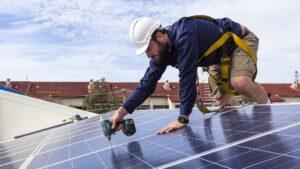In the realm of real estate, creating an eco-friendly home isn’t just about reducing your carbon footprint — it can also enhance property value, decrease utility costs, and contribute to a healthier environment. Here are some practical steps to save energy and reduce waste, turning your home into a sustainable haven.
- Energy-Efficient Appliances
Invest in energy-efficient appliances. Look for the Energy Star label when purchasing devices like refrigerators, washing machines, and dishwashers. They consume less energy, resulting in lower electricity bills and reduced environmental impact.
- Smart Thermostats
Install smart thermostats that learn your habits and adjust temperatures accordingly. These devices optimize heating and cooling, reducing energy consumption while maintaining comfort.
- LED Lighting
Switch to LED light bulbs. They last longer and use less energy than traditional incandescent bulbs, making them an easy and cost-effective way to save energy at home.
- Proper Insulation
Ensure your home is well-insulated. Proper insulation prevents heat loss in winter and keeps the house cool in summer, reducing the need for excessive heating or air conditioning.
- Solar Panels
Consider installing solar panels to harness renewable energy. While the initial investment can be significant, solar panels can substantially reduce electricity bills in the long run.
- Water Conservation
Install low-flow faucets and showerheads to minimize water wastage. Additionally, fix leaks promptly to prevent unnecessary water loss.
- Waste Management
Implement recycling systems at home. Separate recyclables from general waste to minimize the amount sent to landfills.
- Composting
Start a composting system for organic waste. Composting not only reduces waste but also produces nutrient-rich soil for gardening.
- Energy Audit
Consider conducting an energy audit for your home. Professionals can identify areas where energy is being wasted and provide recommendations for improvement.
- Landscaping
Opt for native plants in your garden. They require less water and maintenance compared to exotic species, contributing to a more sustainable landscape.
- Smart Home Technology
Explore smart home systems that enable better control and monitoring of energy usage. From smart plugs to energy monitoring devices, these technologies help optimize energy consumption.
- Educate and Involve
Educate your household members on energy-saving practices. Encourage everyone to participate in reducing waste and conserving resources.
- Government Incentives
Check for local government incentives or rebates for implementing eco-friendly upgrades in your home. There might be financial support available for certain energy-efficient improvements.
- Regular Maintenance
Keep up with regular maintenance of appliances, HVAC systems, and insulation to ensure they operate at maximum efficiency.
By implementing these strategies, you not only contribute to a more sustainable environment but also create a more attractive and cost-efficient home in the real estate market. Sustainable homes are becoming increasingly desirable, and these efforts can potentially increase the value of your property while reducing your ecological footprint.
A commitment to sustainability in real estate is not just a trend but a responsible choice that benefits both homeowners and the planet. Start small, implement changes gradually, and witness the positive impact on your home, finances, and the environment.
Compliments of Virtual Results





 By submitting information, I am providing my express written consent to be contacted by representatives of this website through a live agent, artificial or prerecorded voice, and automated SMS text at my residential or cellular number, dialed manually or by autodialer, by email, and mail.
By submitting information, I am providing my express written consent to be contacted by representatives of this website through a live agent, artificial or prerecorded voice, and automated SMS text at my residential or cellular number, dialed manually or by autodialer, by email, and mail.

Dive straight into the feedback!Login below and you can start commenting using your own user instantly